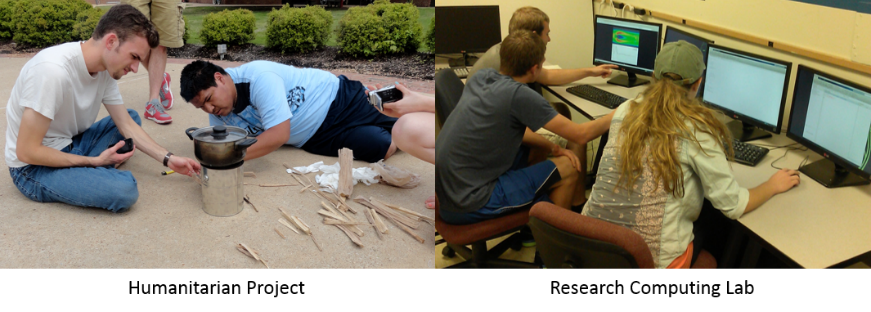
New Engineering Opportunities at Union: Minor and Honors
In an effort to further enhance opportunities for students to pursue excellence in their studies, collaborate across disciplines, and prepare for rewarding careers and/or graduate studies that serve church and society, the engineering department at Union is introducing two exciting new initiatives: A Multidisciplinary Computational Engineering Science Minor (CES Minor) and an Engineering Discipline Specific Honors Program.
 Computational Engineering Science Minor
Computational Engineering Science Minor
The CES Minor combines Union’s existing strengths in engineering, mathematics, and computer science to offer an innovative minor that will open new opportunities to science, engineering, and mathematics students. According to the Society of Industrial and Applied Mathematics: “Computational Science and Engineering is now widely accepted, along with theory and experiment, as a crucial third mode of scientific investigation and engineering design (Ref 1).” Simulations have become common place throughout industry. While structural design and aerodynamic considerations are some of the most widely known applications, a tap changer simulation and design by ABB in Alamo, TN was recently featured as the cover story of an IEEE Spectrum issue on Multiphysics Simulations with COMSOL (Ref 2). To introduce students to the exiting field of computational modeling and simulations, the CES minor combines courses from engineering, mathematics, and computer science: Intro to Matlab (EGR 109), Intro to Computational Engineering (EGR 209), Programming in C (CSC 255), Parallel Computing (CSC 3xx), Linear Algebra (MAT 315), Computational Analysis of Structures (EGR 325), and Numerical Analysis (MAT 360). Depending on the choice of electives, the minor requires that engineering students take 10 credits of coursework beyond the typical requirements for the engineering major.
Engineering Discipline Specific Honors Program

In coordination with Union’s Honors program, the engineering department is introducing a discipline specific honors program. The program consists of an Honors Project, Honors Contract Courses, and Honors Colloquia. The Honors Project is distinctly different from the Senior Design Project and students can choose between 2 options: (a) a Humanitarian Engineering Design Project or (b) a Research Project that provides students with a “taste” of graduate school. Through this honors program, we want to enable and encourage students to discover new knowledge, design new engineering solutions, and pursue their dreams.
Interested students are encouraged to talk to faculty in the engineering department and to consult the 2015/2016 Undergraduate Academic Catalog, which will present the details of each program. It is my hope that students will use these two new opportunities to pursue excellence, explore topics of interest, and prepare for an exciting career of serving Christ through work in the engineering profession.
Georg Pingen
May the favor of the Lord our God rest on us; establish the work of our hands for us-- yes, establish the work of our hands. (Psalm 90:17)
Ref 1: Siam Report on “Undergraduate Computational Science and Engineering Education” (http://www.siam.org/about/pdf/CSE_Report.pdf, page 3).
Ref 2: IEEE Spectrum: Multiphysics Simulation, 2013 (http://www.comsol.com/zmags/multiphysics-simulation-2013)